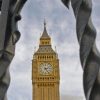
It is said to be a “Covid-secure workplace”, but attempts to protect against the spread of the virus at No 10 are being hampered by narrow “rat runs” through the sprawling townhouse, staff have said.
Insiders said there were “pinch points” where ministers and officials cannot pass more than 1 metre apart within the Downing Street building, which includes the prime minister’s official residence and offices.
It comes as unionised staff in the Department for Business, Energy and Industrial Strategy (BEIS) said they could walk out in December over the lack of Covid safety in their own Whitehall office.
Focus has fallen upon Westminster’s safety measures to prevent the spread of Covid-19 after Boris Johnson and six more MPs were forced to self-isolate at the start of a crucial week for the government.
Photographs apparently showed Johnson standing less than 2 metres from Lee Anderson, the Ashfield MP who tested positive on Sunday, and with neither wearing a mask. The prime minister’s spokesperson insisted no social distancing rules had been broken.
Insiders said that upon entering No 10, visitors are expected to wear a mask and are offered hand sanitising gel. Staff are not expected to wear masks at their desks at all times.
One-way systems have been introduced to the building and screens have been erected between desks, but there are some corridors where staff cannot help but pass each other at less than 1 metre apart, a source said.
“There are plenty of narrow corridors and most are still in use. Some have to be used to both enter and leave a set of rooms, so sometimes people pass each other at close quarters. There is only so much you can do in such an old building,” the source said.
Johnson is continuing to work from his office in No 10, which he can reach from his apartment above No 11 through the garden without meeting others.
When the prime minister tested positive for coronavirus in March, he was quarantined in the flat above No 11 where he lives, and while he kept working for the early stages of his illness. He did not use the office.
Covid in Downing Street: who has been affected by the virus?
Read more
Concerns were raised about the number of cases of Covid-19 among Johnson’s inner circle and across Westminster in March. His former aide Dominic Cummings; the health secretary, Matt Hancock; England’s chief medical officer, Prof Chris Whitty; the chief Brexit negotiator, David Frost; and health minister Nadine Dorries all contracted the virus or showed symptoms.
Speaking on Monday, the prime minister’s spokesman said Johnson’s conduct when meeting MPs was within the rules.
Asked if the prime minster had broken any rules by standing too close to Anderson to pose for the photograph, the spokesman said: “I’m not sure how it’s possible to reach that judgment”, before adding that the two men stood side by side, mitigating any risk.
In Whitehall, staff working in security, cleaning and postal services at BEIS’s head office on Victoria Street will be balloted for possible strike action in December, the Guardian has established.
The PCS union said it is because their contractor, ISS, is refusing to wind down support services, which would allow them to shieldpreventing people from shielding safely. The overwhelming majority of those staff are from the BAME community which has been disproportionately affected by the Covid-19 global pandemic, the union said.
Most civil servants in the department are working from home. However, BEIS, a key department dealing with the UK’s exit from the EU, which is reaching a crucial juncture this week, is insisting staff come into the office.
It emerged earlier this month that an employee in the business secretary Alok Sharma’s inner circle received a positive Covid result, after a union health and safety inspection report identified concerns over social distancing in his office. Sharma was not told to self-isolate by NHS test and trace.
The Public and Commercial Services Union general secretary, Mark Serwotka, said BEIS was continuing to put members “at unnecessary risk by not allowing support staff to stay at home”. He added: “Most civil servants are working well from home and there should be no need for our support staff to continue to put themselves in harm’s way. It is understandable that our contracted-out members have no faith in the minister or this government’s handling of the corona pandemic.”
BEIS and ISS were approached for comment.























































Свежие комментарии